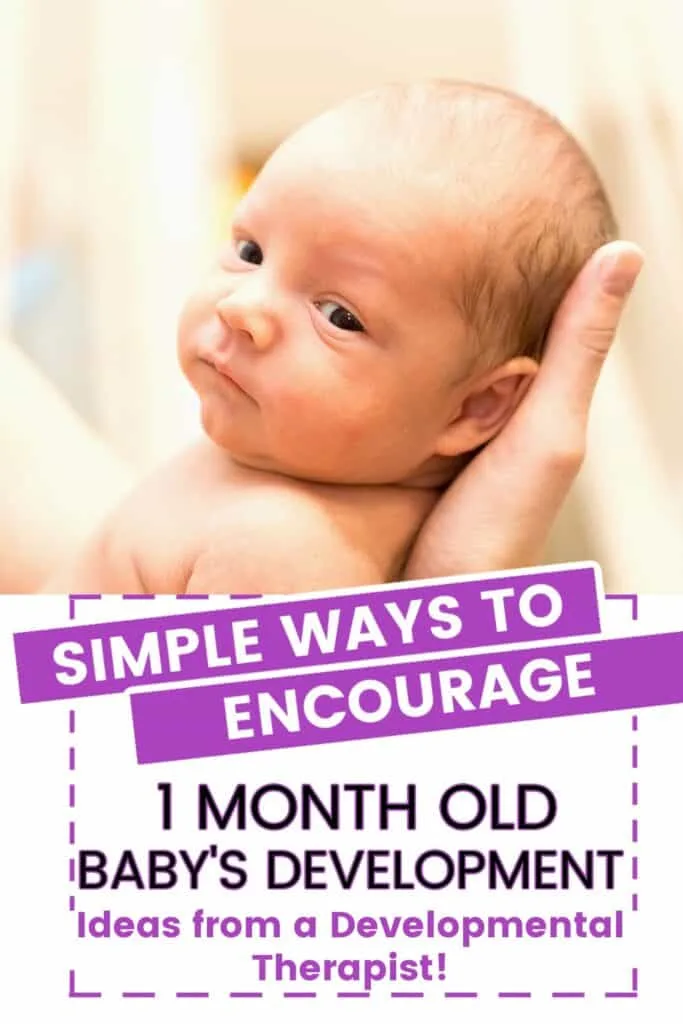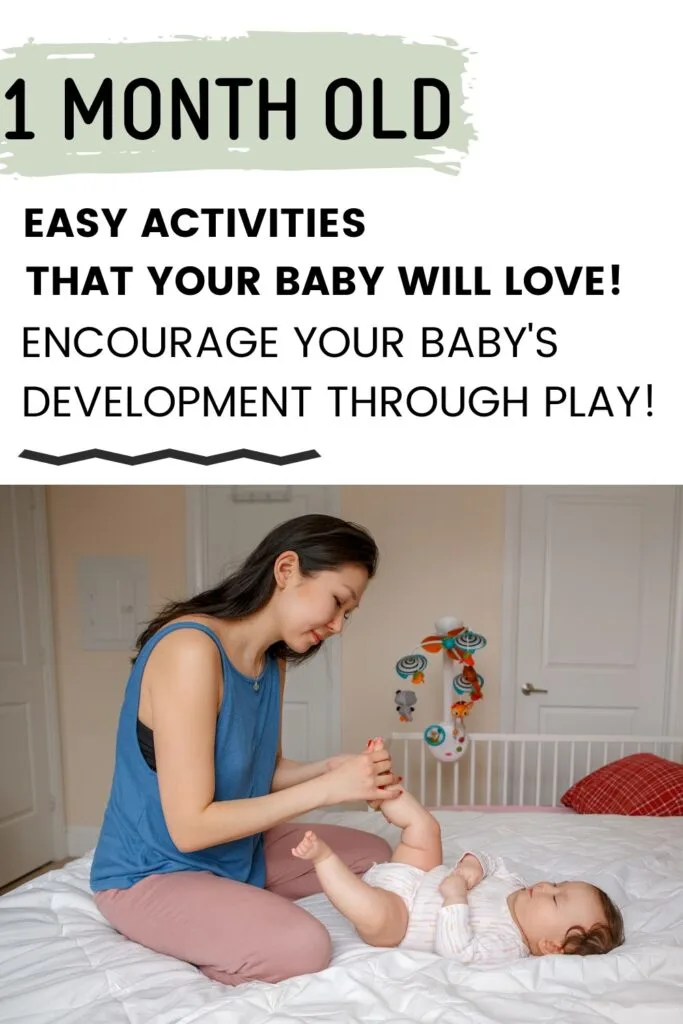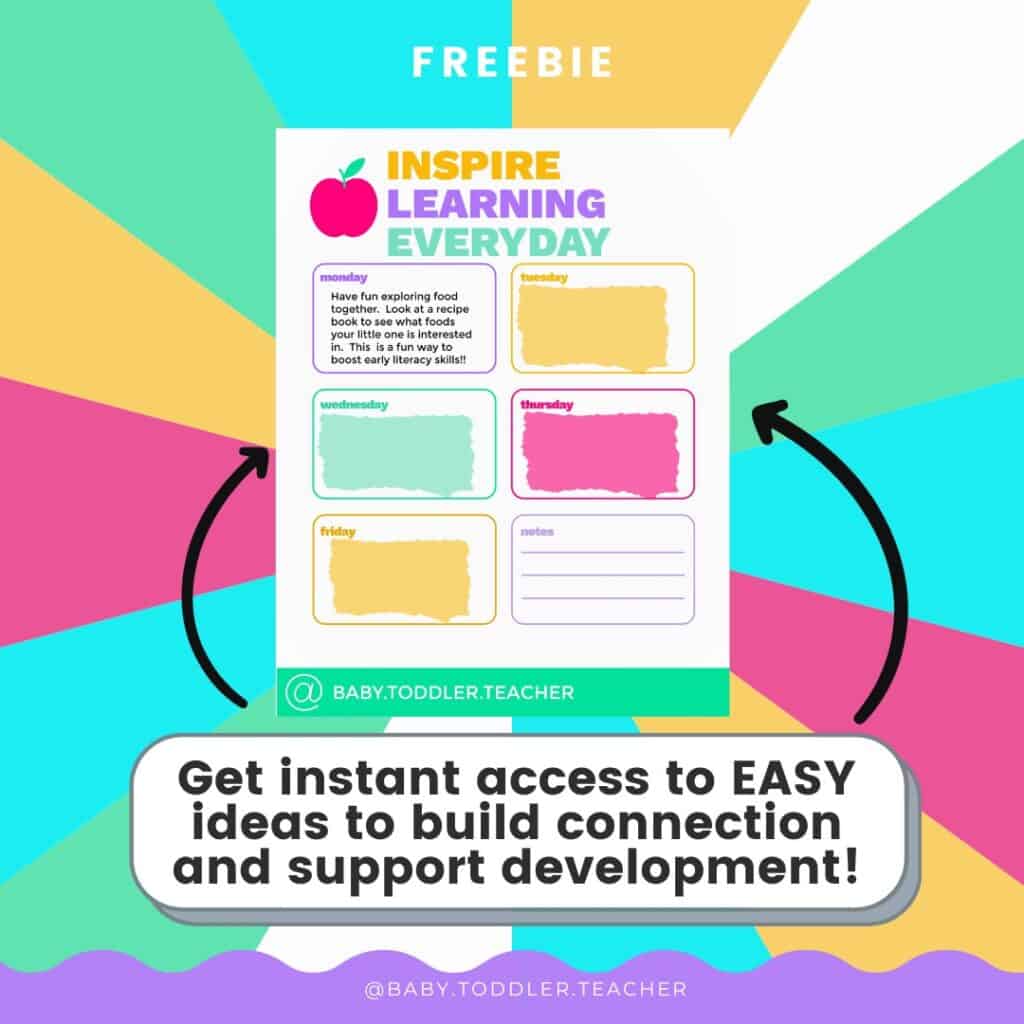As a new parent, it’s natural to want to stimulate and engage your baby as much as possible.
However, it’s important to remember that babies this young can easily become overstimulated, and sometimes less is more.
I remember with each of my little ones it seemed like they spent most of the day sleeping, eating, and pooping.
And that is most of what makes up those early weeks!
However, there are some ways that you can provide your little one with simple learning opportunities throughout the day.
In this blog post, we will discuss some simple learning activities for your 1-month-old baby that will help them develop and grow without overwhelming them.
Engaging and playing with your little one during their first month is a crucial part of their early learning and development.
Personal interaction, even if it’s as simple as cuddling, talking, or singing to your newborn baby, can stimulate their senses and foster a strong emotional connection.
However, it’s important to remember that while nurturing your baby is a top priority, so is taking care of yourself, especially during the postpartum period.
The postpartum period can be a physically and emotionally demanding time for a new mother as her body heals and she adapts to life with a newborn.
It’s essential to give yourself time to rest and recover.
Balancing the needs of your baby with your own self-care is not a sign of selfishness, but rather an understanding that a healthier, happier parent is more capable of providing the care and attention their baby needs.

(This post may contain affiliate links. To read our full disclosure policy click here.)
What Skills is a Newborn Baby Working On?
At one month, babies are developing crucial skills that lay the groundwork for their motor, sensory, and cognitive development.
Here are some of the key milestones for a one-month-old:
- Motor Skills: Your baby’s neck muscles are strengthening, and they might begin to lift their head for short periods when lying on their stomach.
- Sensory Development: Their sense of hearing is improving. They may start turning their head towards familiar sounds, such as the parent’s voice.
- Visual Skills: Babies at this age begin to focus on objects 8 to 12 inches away, and they start to follow objects with their eyes.
- Social and Emotional Development: Your little one might start recognizing mom and dad’s voices and smells, and will begin to show a preference for human faces over other shapes.
Remember, each child develops at their own pace, so don’t worry if your baby takes a little longer to reach these milestones.
Always consult with a pediatrician or early intervention if you have any concerns.

Tummy Time is Important for Gross Motor Skills
Tummy time is a great activity for babies to develop their head control, upper body strength, and motor skills.
Start by placing your baby on a firm, flat surface like a play mat.
Get in front of baby and provide some encouragement and motivation to keep them engaged.
You can use toys (here are some of my favorites) or other objects to help catch their attention and motivate them to lift their head.
Gradually increase the amount of time your baby spends on their tummy to help them build strength and confidence.
Watch your baby’s cues and when they seem to get tired or frustrated make sure to take a break.
Starting with small frequent intervals of tummy time is best when it comes to your baby’s development.
Work on Fine Motor Skills During Your Daily Routine with your New Baby
Incorporating fine motor skill development into your daily routine with your baby can be simple and enjoyable.
One of the most effective ways is to encourage your baby to grasp your finger while you’re dressing them.
This activity not only strengthens their hand muscles but also enhances their grip.
Another simple activity involves the folding of laundry.
Introduce your baby to various textures by letting them gently touch and play with different fabrics.
This activity is particularly beneficial as it stimulates their tactile senses and encourages the development of fine motor skills.
Singing your favorite songs and fingerplays like “Itsy Bitsy Spider” can be a great option as well because these activities stimulate the auditory senses and accelerate language development.
These simple songs and rhymes introduce your baby to the rhythm and melody of language, laying the foundation for speech and language skills.
Moreover, accompanying these songs with fingerplays engages your baby’s visual and tactile senses, promoting hand-eye coordination and fine motor skill development.
Not to mention, the repetitiveness of these songs can be soothing for your baby, strengthening the emotional bond between you and your little one.
It’s a fun and engaging way to interact with your baby while also contributing to their developmental milestones.
Remember, activities that promote fine motor skills are not just about strengthening your baby’s hand and finger muscles.
They also aid in the development of eye-hand coordination, which is crucial for their future skills like writing, buttoning clothes, and using utensils.
Work on Visual Tracking with Interesting Objects
Brightly colored toys can be an excellent tool to encourage your baby’s visual tracking skills.
Smaller toys that are easy for their eyes to follow are ideal.
Move the toy slowly in front of your baby’s face, from side to side, and then up and down.
Ensure the toy is at a safe distance, ideally about 8-12 inches away, where their focus is strongest.
Incorporating this activity during diaper changes can turn a mundane task into a fun learning experience.
Either before or after changing your baby’s diaper, take a few minutes to play this tracking game.
It will not only help strengthen their eye muscles and improve their ability to follow moving objects but also establish a positive association with diaper changes.
Remember to keep your movements slow and watch your baby’s reactions.
If they seem disinterested or agitated, give them a break.
As always, the key is to keep the activity fun and stress-free for your little one.
Encouraging Language Development During Diaper Changes
Diaper changes provide a great opportunity to engage your baby in language learning.
A simple way to encourage language development is to model different sounds and see how they react.
As you keep doing this over the months you will notice that they pay attention and they may even try to imitate you!
Narrating what you are doing during the diaper change is another excellent strategy.
For example, you can point to your baby’s tummy and say “Let me change your diaper so you will be nice and dry.”
This sort of repetition helps them learn words and strengthens their language comprehension.
In addition to speaking to your baby during diaper changes, singing songs or nursery rhymes can be highly beneficial.
Songs like “The Wheels on the Bus” or “Old MacDonald Had a Farm” are not only entertaining for your little one but also introduce them to the rhythm and melody of language.
The repetition in these songs can make them easier for your baby to remember and eventually, to sing along to.
Remember to maintain eye contact and use expressive facial expressions while singing, as this will further encourage your baby’s language development.
Lastly, don’t forget to respond to your baby’s coos and babbling.
This conversation-like exchange reinforces their attempts at communication and encourages them to keep practicing their language skills.
Even at an early age, meaningful interactions with your baby can lay the groundwork for effective communication skills later in life.
CLICK HERE for more easy ways to encourage your baby’s development all day long!

New Parents can Work on Emotional Development Throughout the Day
Emotional development is a vital aspect of a baby’s overall growth, and it starts right from birth.
For new parents, recognizing and labeling emotions can be a highly effective way to encourage your one-month-old baby’s emotional development.
As you spend time with your baby, make it a habit to express your feelings out loud.
For instance, while feeding them, you could say, “Mommy is so happy to feed you.”
Or when they’re fussy, you could acknowledge their emotions by saying, “I see that you’re upset, let’s try to calm down together.”
Babies are perceptive and can pick up on your expressions and tone of voice.
By hearing you label emotions, they begin to associate feelings with words, which lays the groundwork for emotional literacy later on.
It’s also important to reassure your baby and respond to their needs promptly.
If they’re crying, for example, hold them close and say, “I can see you’re upset, but you’re safe with mommy/daddy.”
This not only helps your baby feel secure but also teaches them about empathy and care.
Remember, the expression of emotions is a crucial part of human interaction.
By encouraging emotional development in your baby, you’re helping them understand their feelings and the feelings of those around them, which is a critical component of emotional intelligence.
Be patient, as this process takes time, and remember that consistency is key.

Grab your FREE Milestone Guide HERE.
Build Cognitive Skills During Book Time and Singing with Your Baby
It’s never too early to start reading and singing to your baby.
It is one of the best ways to support brain development and language skills.
Choose simple books with bright colors and high-contrast images to catch your baby’s attention.
Nursery rhymes and lullabies are also great options that can help soothe your baby and create a comforting environment.
Make sure to use a calm and soothing tone of voice to help your baby feel calm and relaxed.
Always watch your baby’s cues as well and take breaks when they need to.
These activities are a great way to bond with your baby and help them learn about the world around them.
Introducing Sensory Play During the First Month
In the early stages, sensory play can be kept incredibly simple and gentle, as everything is a new sensory experience for a newborn.
Grab your laundry basket, and instead of folding clothes while they nap just include them in the task by exploring fabrics with different textures!
This was one of my favorite ways to play with my babies in the newborn days and I still have great memories from it!
Start with soft tactile experiences like stroking your baby’s skin with different fabrics, such as silk or cotton to introduce them to a variety of textures.
Ensure that the materials are clean and safe for your baby’s sensitive skin.
Remember, the key is to keep sensory play light and not overstimulate your newborn.
Light rattles can provide auditory stimulation, and simple black and white (grab some free printable cards here) or high-contrast cards can captivate their sight without overwhelming them.
Even sitting outside or going for a walk can be a fun way to get some fresh air and let your baby hear, see, and feel things outside.
Always be mindful of your baby’s reactions and moods during sensory play, ensuring it’s a joyous and enriching experience and not a source of stress.
For more easy ideas and activities on how to support your baby’s development CLICK HERE.
The Importance of Independent Play and Supervision for Newborns
Independent play is an essential part of a newborn’s cognitive and physical development, even though it might look significantly different at this early age compared to older babies.
At this stage, independent play might look like your baby lying comfortably on a play mat staring at a mobile or capturing fascination with their own fingers.
They’re exploring their surroundings and starting to make sense of the world, one baby-sized discovery at a time.
Despite the importance of independent play, it is crucial to remember that newborns should not be left unsupervised during these play sessions.
As a parent, your role shifts from an active participant to a watchful observer.
Watch as your baby interacts with their environment, but resist the urge to guide their movements or play.
This allows your baby to explore at their own pace and in their own way, which is vital for their self-discovery and confidence.
While your baby is engaged in independent play, remember to stay close, ensuring their safety and ready to step in if they become upset or uncomfortable.
The goal is not to isolate your baby but to create a safe and supportive environment where they can explore and learn independently.
Your gentle observation is a reassuring presence to your child, letting them know that while they explore, they’re not alone.
They have a safe and loving guide ready to step in when needed, helping them navigate and learn about their exciting new world.

Enjoy These 1-Month-Old Baby Activities
While it’s natural to want to provide your baby with every opportunity to grow and learn, it’s important to remember that at this young age, less is more.
By incorporating these simple learning activities into your daily routine, you can help your 1 month old baby develop and grow without overwhelming them.
Remember, every baby is unique and will develop at their own pace, so don’t feel discouraged if your baby takes a little longer to reach certain milestones.
The most important thing is to enjoy this special and exciting time with your little one and treasure every moment together.
Frequently Asked Questions
Everything is new to your baby at 1 month so keep in mind that less is more as we don’t want to overstimulate them. Take time to cuddle, sing, and read to your baby. Giving your baby the opportunity to play supervised on the floor can be a great option as well.
You can start by introducing sensory play to stimulate your baby’s brain. Consider activities like stroking their skin with different fabrics, or gently rattling light toys for auditory stimulation. You can also read and sing to your baby, as this helps promote language skills and brain development. Always keep an eye on their reactions and take breaks when needed.
You can start tummy time pretty much from the very beginning. Start with very short increments and work your way up/ Always follow your baby’s cues and give them breaks as needed.
Related Posts You Will Enjoy
The Best Baby Development Toys 0-6 Months
When do babies say “dada” and “mama”?
Everything You Need to Know about Emotional Development 0-6 Months
Early Communication: How to Teach Pointing to Your Baby
The Best Math Activities for Infants and Toddlers


Kayla O’Neill has a master’s degree in education as well as a bachelor’s degree in special education with an emphasis in early childhood education. She has been working as a developmental therapist with babies and toddlers in early intervention since 2012. She is also a mom with two young children.
